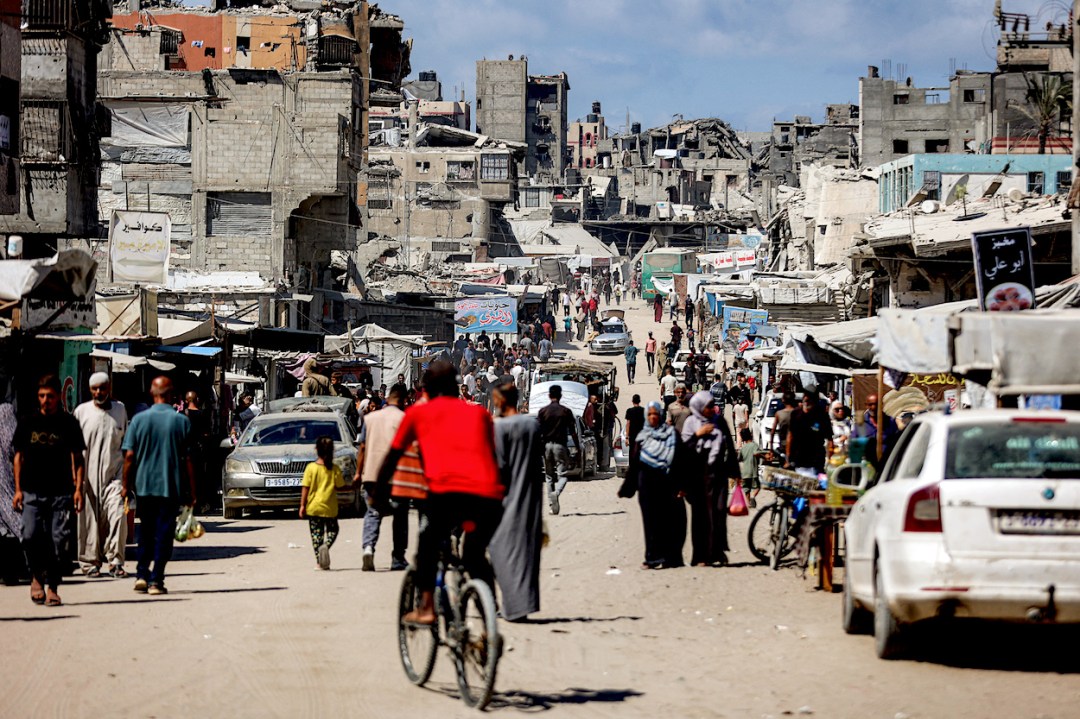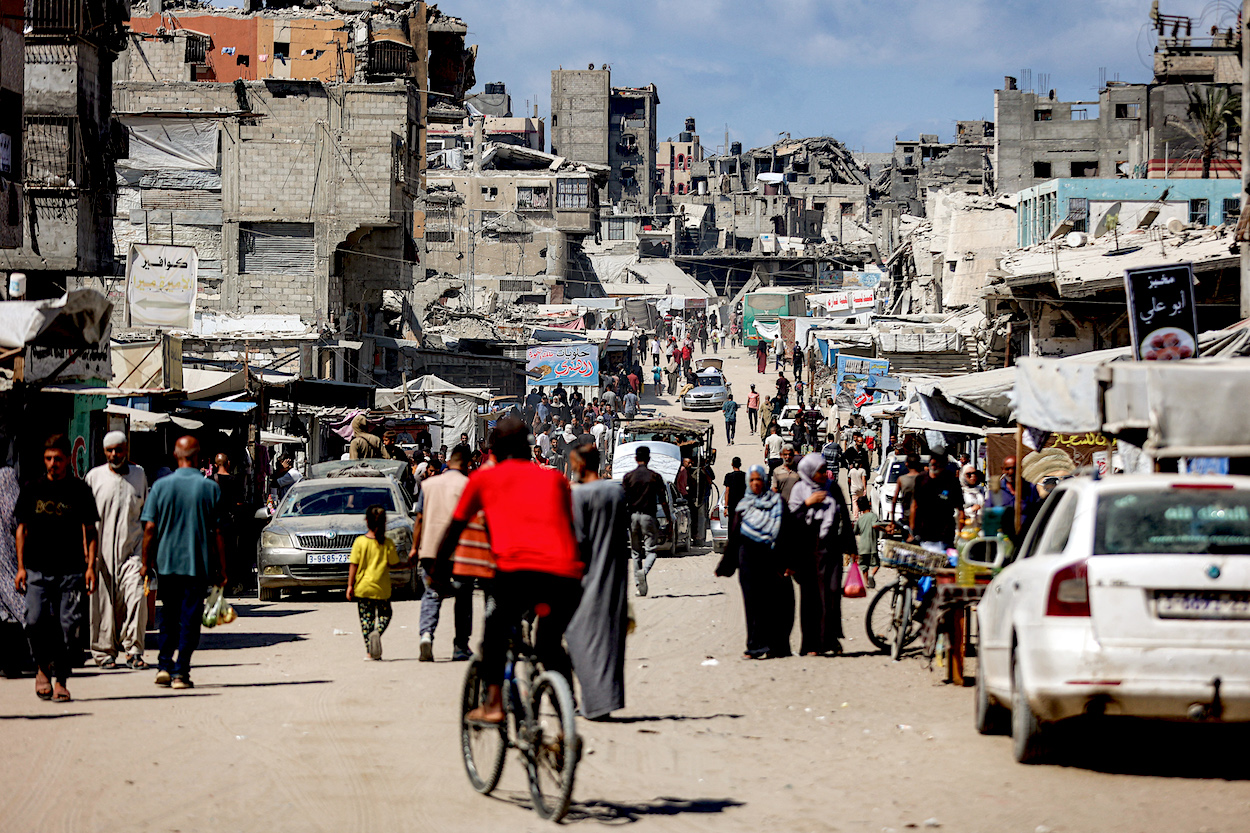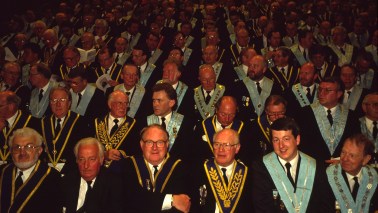Discussion of Donald Trump’s peace proposal for Gaza revolves around one question: who is for it and who is against it? Israel is for it, though mostly because it is backed into a corner and has no choice. The Arab states are for it, which is to be expected since they wrote it. The European Union is for it, which is to be expected since the Arabs are for it. Palestinian Islamic Jihad and the Houthis are against it, and Hamas is expected to be too. I don’t know what the UK government has said and, in concert with the rest of the world, I don’t really care.
This is all helpful to know, but there’s a more important question, the answer to which will decide the fate of Trump’s framework in the long run: has anyone asked the Palestinians? Not their leaders in Hamas or the Palestinian Authority, but the Palestinian street, civil society, the intellectuals, the media, the mosques, the private sector, and the activists. Western liberals, from policymakers to journalists and more besides, talk about Hamas as though it is an imposition on Gazan civilians, rather than the outfit those civilians voted for 20 years ago and which continues to reflect the ideology and commitment to violence of a significant number of Palestinians. Get rid of Hamas, these idealists assure us, and Gaza could flourish at last.
This is, in essence, the theory behind the Trump blueprint. One of its reported conditions is the exclusion of Hamas from the governance of Gaza. What with their fondness for the old mass murder, that sounds quite sensible. Unfortunately, the Palestinian population is still pretty keen on them. When you point out that the Palestinians voted for Hamas, an openly genocidal terrorist organisation, in the 2006 legislative elections, a ballot that monitors from the Jimmy Carter Centre certified as ‘peaceful, competitive, and genuinely democratic’, well-meaning liberals assure you that many Palestinians alive today have never had a chance to vote, the implication being that they would vote for parties other than Hamas.
It might be a persuasive argument if Palestinian opinion polls didn’t exist, but alas they do, and they underline the gulf between the Palestine that exists in the minds of western policymakers and commentators and the Palestine that exists on the ground in Palestine. The most recent polling from the Palestinian Centre for Policy and Survey Research, conducted in May, asked Palestinians how they would vote in an election to the Palestinian Legislative Council. Hamas came out on top with 43 per cent, 15 points clear of its nearest rival; among voters in Gaza, support was 49 per cent. Asked whether they would support the disarming of Hamas ‘in order to stop the war on the Gaza Strip’, 85 per cent of Palestinians in the West Bank and 64 per cent in Gaza were opposed. Asked whether they endorsed expulsion of some Hamas terror leaders from the Strip in exchange for Israel ending its military operations, 65 per cent were against it. The Palestinians would do anything for peace except make it.
It’s not that Palestinians have particular affection for Hamas. There is deep discontent with the party, its management of the terror campaign against Israel, and the state of the economy and social provision in Gaza. But Palestinian nationalism is first and foremost about opposition to Israeli nationhood, and Hamas is perceived as strong on that issue. This point cannot be emphasised enough: Palestinian Arab national identity as we understand it today was a reaction against the rise of Palestinian Jewish national identity in the early 20th century. It is a fusion of Arab supremacism, Islamic imperialism, Soviet-promoted third worldism and fanatical anti-Semitism. That is not to claim that all Palestinians think like this or that no other articulation of Palestinian national identity is possible. There are Palestinians who want genuine peace and co-existence with Israel – a permanent peace, not a holding pattern until Greater Palestine can be liberated – and while some on the Israeli right continue to dispute the idea of Palestinian indigeneity, the plain fact is that there now exists a distinct Palestinian Arab nation defined by a common culture, language and claimed territory.
The impasse comes from peace and coexistence with Israel being minority pursuits within Palestinian society, the preserve of educated, pro-western liberals and leftists whose views lie far outside the mainstream. These views are represented in political parties such as Third Way and Palestinian Justice, who between them managed less than three per cent of the vote in 2006. This is a function of something few in the West want to hear: the primary impediment to Palestinian statehood is not the Israelis but the Palestinians. Or rather Palestinian culture and its orientation towards extremism, violence and righteous victimhood. That culture has developed over more than a century, ginned up by one political leader after another, rewarded by societal glory and cold hard cash, passed down from generation to generation, inculcated in school lessons and textbooks, and by the Palestinian custom of celebrating of the murder of Israelis.
There is an opportunity in all this for Israel
It is not merely deradicalisation that is required, but the replacement of a destructive Palestinian culture with a productive one, an almighty feat and one unlikely to be achieved by any transitional authority. Necessary to the creation of a viable, enduring Palestinian state is the existence of a country ready to step up to the demands of such a state. That country does not exist yet and constructing it could take generations. Do the Americans have the stamina, to say nothing of the interest, to see this project through? I have my doubts.
There is an opportunity in all this for Israel. For years it has been lectured and hectored and censured and sanctioned for its military operations in Gaza. Now its critics will get the chance to run Gaza and show Benjamin Netanyahu how it’s done. Israel should step back and let them get on with it. Defend itself where necessary, of course, but no more will it be the world’s regional enforcer behind closed doors and its punching bag out in public. Let’s see how the transitional authority handles terrorism and extremism, how it polices humanitarian aid deliveries for weapons smuggling, and how it will prevent the political and economic infrastructure it creates for Gaza from falling back under the control of Hamas or a likeminded organisation.
The world wants Israel out of Gaza. This proposal will get Israel out of Gaza. One last question, though: what happens next?









Comments